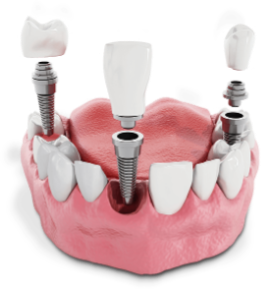

The Life-Changing Benefits of Dental Implants
Easy maintenance
Protects the jawbone
Natural-looking
Improved speech
Restores biting strength
Preserves facial appearance
Protects adjacent teeth

The Life-Changing Benefits of Dental Implants
Easy maintenance
Protects the jawbone
Natural-looking
Improved speech
Restores biting strength
Preserves facial appearance
Protects adjacent teeth
Our Dental Implant Options

Single Implants
A single dental implant is an excellent solution for those missing one tooth. These dental implants are crafted to resemble and emulate natural teeth’ appearance and sensation, rejuvenating your smile and enhancing your self- assurance. Single dental implants consist of a metal post surgically implanted into the jawbone to serve as a foundation for a replacement tooth. This post functions as a tooth root, offering a reliable and enduring solution for tooth loss.

Dental Bridges
A dental bridge is a prosthetic device designed to replace a missing tooth within an individual’s mouth. This artificial tooth necessitates the presence of natural teeth on either side to facilitate the secure attachment of the prosthesis to the adjacent teeth surrounding the gap. Dental bridges enhance the aesthetic appeal of the smile and the overall contour of the face, thereby contributing to an individual’s self-esteem. They play a crucial role in stabilizing the neighboring teeth, preventing them from shifting to occupy the space left by a missing tooth.

Implant Supported Dentures
An implant-supported denture is a dental device designed to replace multiple teeth simultaneously. It resembles a conventional denture; however, rather than sitting on the gums, it is securely anchored to the jawbone through dental implants. Implant-supported dentures are the best tooth restoration solution for entirely replacing the function and appearance of natural teeth.

Full Mouth Dental Implants
Full mouth dental implants are employed to achieve a comprehensive restoration for individuals who have experienced significant tooth loss. Full mouth dental implants are comprised of multiple dental implants anchored in the jawbone, along with a series of external teeth supported by these implants. Full mouth dental implants are long-lasting, comfortable, stable, and look and feel natural. People with many missing or damaged teeth in their upper or lower arch may be suitable candidates for them.
The Dental Implant Procedure
Step 1: Consultation & Planning

Our comprehensive consultation process is designed to address your dental concerns and aspirations for a beautiful smile. During your initial
appointment, we prioritize understanding your specific needs and goals. Through an extensive oral examination and advanced digital diagnostic
tools, we aim to gain a thorough understanding of your dental structure. This in-depth evaluation is crucial in determining your suitability for
dental implants.
With this essential information, Syed Z. Sayeedi, DDS will develop a customized treatment plan designed specifically for your needs. We are
committed to meeting and exceeding your expectations throughout the implant procedure.
Step 2: Procedure & Same-Day Teeth

Once your treatment plan is created, we will schedule your surgery. On the day of your surgery, we will administer the sedation method you have chosen to ensure your comfort throughout the procedure. We will then make small incisions in your gums to access the underlying bone. Following this, 4 to 6 implant posts will be positioned by our Yomi robot in the jawbone areas with the greatest density. Once the implants are firmly secured, a connector will be affixed to each implant, and a temporary prosthetic will be placed over them. This temporary prosthesis allows you to enjoy the benefits of your brand-new smile without the wait, meaning you never go without teeth!
Step 3: Follow-Up Appointment

In the coming months, we will closely monitor your recovery to ensure that your body heals properly and that the implants integrate
successfully. During this visit, we will perform a comprehensive evaluation of your implants’ healing progress, checking their stability and your
overall recovery. This appointment will also allow you to address any concerns or questions you may have about your healing journey.
We understand that this period can be filled with uncertainty, and we are here to offer support and information every step of the way. Whether
you have questions about pain management, activity restrictions, or any other aspect of your recovery, Syed Z. Sayeedi, DDS and our team are
dedicated to providing guidance and reassurance.
Step 4: Healing & Final Restorations

In the upcoming 4 to 6 months, dental implants will integrate with your jawbone through osseointegration. This integration is essential as it
establishes a solid and stable foundation for your new smile. The implants will bond with the bone tissue, creating a strong anchor that mimics
the function of natural tooth roots.
Once the integration process is finalized and your mouth has completely healed, we will place your final prosthesis. These prosthetics are
designed to blend seamlessly with your natural teeth, allowing your new teeth to look natural. You can enjoy a lifetime of healthy smiles with
regular check-ups and proper at-home care!

Avoid Making Costly Mistakes!
Dental implants are a lifetime investment in your health, function, and quality of life. Avoid the common mistakes people make when considering implants by following our recommendations.

Find out if you're a
Candidate For Dental Implants

